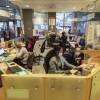At this point, with little data available, there are more questions than answers about the new COVID-19 variant, omicron: Do its mutations make it more contagious? Will the existing vaccines effectively prevent omicron infections?
And as cases continue to pop up around the country — with a second one identified in Minnesota on Thursday — many in Massachusetts are eager to know, is omicron is already here? And if so, would we even know?
The answer is a resounding "maybe." Massachusetts labs are actively looking for the new variant in positive tests, and the state’s ability to monitor COVID-19 variants has improved significantly over just the last nine months. But incomplete testing surveillance means the variant could already be in the commonwealth undetected.
Last spring, as the delta variant was on its way to becoming the dominant strain of COVID-19 in the state and nationally, only about 1% of positive COVID tests in Massachusetts were analyzed in laboratories using genomic sequencing to determine what strain they were.
Over the past three months, about 20% of reported positive COVID tests were sequenced in Massachusetts, according to data from GISAID, a global database tracking COVID numbers. That’s one of the highest percentages in the country.
"In an ideal scenario, we would be able to sequence every positive case, but that is just not realistic at this point," said Dr. Bronwyn MacInnis, director of Pathogen Genomics Surveillance at the Broad Institute, which runs and analyzes COVID tests for the state. "We'd love to have more, but we're happy to have this picture. And it does give us quite a bit of statistical power to detect these low-frequency, even emerging variants at the earliest possible stage."
The Broad Institute has the capacity to sequence about 7,000 positive COVID tests a week, she said. Over the summer, when case numbers were significantly lower, virtually all positive tests were sampled.
MacInnis said identifying omicron in Massachusetts could help researchers answer some of the many open questions about the variant.
"Especially in Massachusetts with so much research infrastructure," she said, "[we can quickly] get it into some of the research labs who are studying the virus to understand what the mutations that it has means for vaccines, for therapeutics, for transmission, we could learn a lot very quickly."
The Institute for Applied Life Sciences at UMass Amherst has administered roughly 600,000 COVID tests over the last year or so to members of the university community and others in the surrounding public, according to institute director Peter Reinhart. They are sequencing all positive tests, and are now on the lookout for this new variant.
"Anything that would show up with a omicron signature, we would know about," Reinhart said.
Even so, Reinhart said, some omicron infections could exist in Massachusetts without being detected.
"Everyone that picks up an at home test at CVS and ends up testing positive. Do they report that positive to the state? Probably not," Reinhart said. "So you could have quite a few omicron positives circulating in the population, and nobody will know until one of those positives is tested in an environment that follows up the positive result with a sequencing experiment."
Another method for seeing how prevalent COVID-19 is in the community has been to test for the presence of the virus in wastewater. A private company that tests Massachusetts’ wastewater for the state, Biobot, confirmed this week that it has just begun examining samples for the presence of omicron.
Smaller labs could potentially detect the variant using one of two other methods that are simpler than genomic sequencing. A method called SNP genotyping can more quickly identify the mutations that make the variant unique, and basic COVID tests can identify an omicron marker known as S-Gene Target Failure. Those methods don’t provide as much information as a full genomic sequencing, but MacInnis said they could be useful tools for labs that can’t do full genomic sequencing.
But it would take a crystal ball to know if the variant is already in Massachusetts, Reinhart said.
"When these things start circulating the globe, usually the U.S. is there near the beginning," he said. "And I suspect the same thing will play out here. I do think it's spread more widely in the U.S. than we know about now. And it's anyone's guess as to whether it's in Massachusetts already or not."








